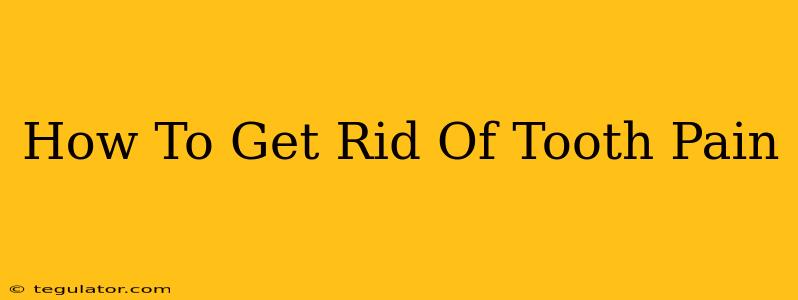Tooth pain is a common problem that can range from a mild ache to a severe, throbbing pain. It can disrupt your daily life, making it difficult to eat, sleep, and even concentrate. While the best solution is always to see a dentist for a proper diagnosis and treatment, there are several things you can do at home to alleviate tooth pain temporarily. This guide will explore effective home remedies and when it's crucial to seek professional dental care.
Understanding the Causes of Tooth Pain
Before diving into remedies, it's important to understand what might be causing your toothache. Several factors can contribute to tooth pain, including:
- Cavities: Decayed areas in the tooth's enamel can expose the sensitive dentin, leading to pain.
- Abscesses: A pocket of pus formed at the root of a tooth, often caused by an infection. This is a serious condition requiring immediate dental attention.
- Gum disease (Gingivitis or Periodontitis): Inflammation and infection of the gums can cause pain and discomfort.
- Cracked or chipped teeth: Trauma to a tooth can lead to pain, especially when chewing or biting.
- Teeth grinding (Bruxism): This can wear down tooth enamel and cause sensitivity and pain.
- Sinus infection: Sinus pressure can sometimes radiate to the upper teeth, causing pain.
- Impacted wisdom teeth: Wisdom teeth that don't have enough room to erupt can cause pain and inflammation.
Home Remedies for Temporary Toothache Relief
While home remedies can provide temporary relief, they are not a replacement for professional dental care. If your tooth pain persists or worsens, seek immediate dental attention.
1. Saltwater Rinse: A Simple and Effective Solution
Rinsing your mouth with warm saltwater can help reduce inflammation and clean the affected area. Dissolve ½ to ¾ teaspoon of salt in a glass of warm water and gently swish it around your mouth for 30-60 seconds, then spit it out. Repeat several times a day.
2. Cold Compress: Numbing the Pain
Applying a cold compress to the affected area can help numb the pain and reduce swelling. Wrap a few ice cubes in a thin towel and apply it to your cheek near the painful tooth for 15-20 minutes at a time. Take breaks to avoid damaging your skin.
3. Over-the-Counter Pain Relievers: Temporary Pain Management
Over-the-counter pain relievers such as ibuprofen (Advil, Motrin) or acetaminophen (Tylenol) can help manage pain and reduce inflammation. Always follow the dosage instructions on the packaging.
4. Clove Oil: A Natural Analgesic
Clove oil has natural analgesic and antiseptic properties. Apply a small amount of clove oil directly to the affected tooth using a cotton swab. Be cautious, as it can be quite strong.
5. Peppermint Tea Bags: Soothing Relief
The menthol in peppermint tea has a cooling effect that can soothe sensitive teeth. Steep a peppermint tea bag, allow it to cool slightly, and then apply it to the affected area for several minutes.
When to See a Dentist: Recognizing Urgent Situations
Some toothaches require immediate professional attention. Do not delay seeking dental care if you experience:
- Severe, throbbing pain: Pain that doesn't respond to home remedies.
- Swelling in your jaw or face: This could indicate an infection.
- Fever: A sign of a serious infection.
- Difficulty opening your mouth: This can be a sign of a severe infection or injury.
- Persistent pain lasting more than a few days: Home remedies should provide only temporary relief.
Ignoring a serious toothache can lead to severe complications, including abscess formation, bone loss, and even spread of infection to other areas of your body. Your dental health is crucial for your overall well-being.
Preventing Tooth Pain: Proactive Measures
Preventing tooth pain is far easier than treating it. Here are some essential preventative measures:
- Maintain excellent oral hygiene: Brush and floss twice a day.
- Visit your dentist regularly for checkups and cleanings: Early detection of problems can prevent more severe issues.
- Eat a healthy diet: Limit sugary drinks and snacks.
- Consider a mouthguard if you grind your teeth: This can protect your teeth from wear and tear.
By combining effective home remedies with regular dental checkups, you can effectively manage tooth pain and maintain a healthy, pain-free smile. Remember, however, that home remedies are temporary solutions, and timely professional dental care is crucial for long-term oral health.

